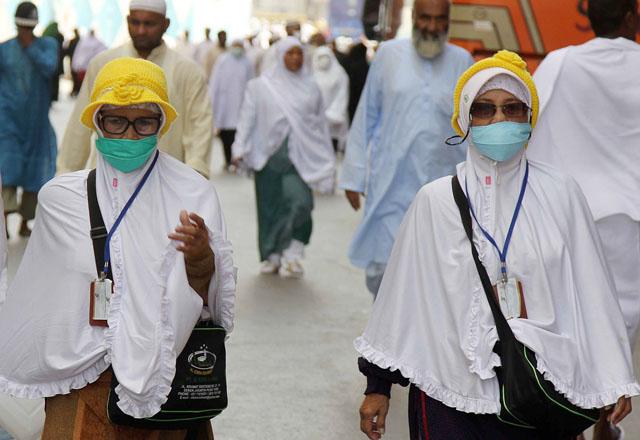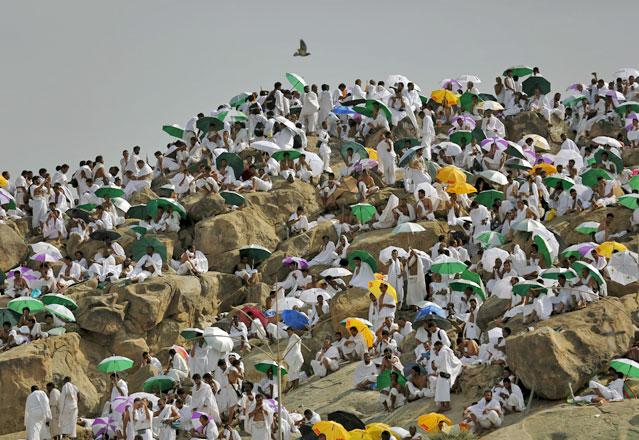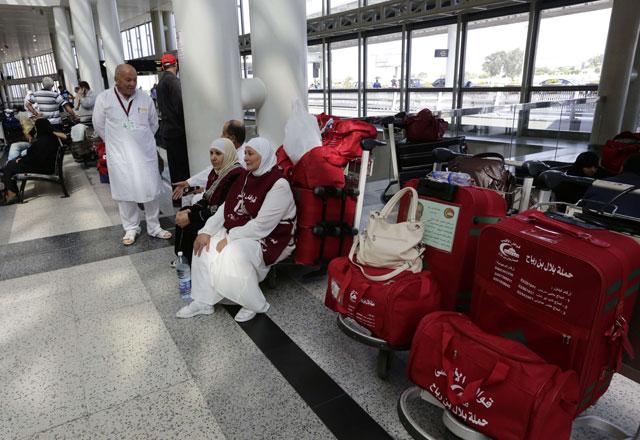You are here
Pilgrims pour into Saudi Arabia undeterred by MERS fears
By AFP - Jun 07,2014 - Last updated at Jun 07,2014

MECCA — Muslim pilgrims from around the world are pouring into the Holy City of Mecca in Saudi Arabia, undeterred by the spread of the MERS virus which has killed 284 people in the kingdom.
The faithful who dream of visiting Islam’s holiest shrines in Mecca and Medina travel to western Saudi Arabia to perform umrah (the lesser Muslim pilgrimage throughout the year).
“We have received warnings by authorities in our country about MERS and were informed of the importance of taking precautions,” said 45-year-old Abdullah, a pilgrim from Malaysia.
Wearing a mask, Abdullah said he applies disinfectants as he enters the crowded Grand Mosque in Mecca. “God will protect me,” he said.
More pilgrims are expected to arrive with the approach of the Holy Month of Ramadan, which starts late in June, and sees hundreds of thousands descend on Mecca for umrah.
But numbers will rocket when the faithful arrive for the Hajj pilgrimage, the largest annual religious gathering worldwide, which takes place this year in October.
Local authorities in Mecca are distributing leaflets and brochures containing advice on hygiene and measures to minimise the risk of infection by the mysterious Middle East Respiratory Syndrome.
Tunisian pilgrim, Safia Ben Mohammed shrugged off the fears of MERS.
“I am not afraid,” she said.
“It was not easy to come here, so I couldn’t have postponed my pilgrimage,” said the 56-year-old woman, insisting she was “complying with the medical precautions”.
In a preemptive measure to avoid a potential importation of the virus, which has reached more than a dozen countries and as far afield as the United States, Tunisian authorities are advising their nationals to postpone their plans for pilgrimage this year.
The cases outside the Middle East relate to people who became ill while in the region, with some involving pilgrims travelling to Mecca.
Last year, five million pilgrims visited the kingdom for umrah and Hajj.
This year, the number of umrah pilgrims has reached 4.8 million since the start of the lunar Muslim calendar in October, according to official statistics.
Fears mounted in April when several cases of infection were registered in the western city of Jeddah after MERS had been largely confined to Eastern Province, where it first appeared in April 2012.
The port city of Jeddah, which lies 80 kilometres north of Mecca, is the main entry point for pilgrims.
But Saudi Arabia’s Hajj ministry dedicated specifically to the annual pilgrimage has not yet taken any special measures related to MERS.
MERS is considered a deadlier but less transmissible cousin of the SARS virus that appeared in Asia in 2003 and infected 8,273 people, 9 per cent of whom died.
The coronavirus first appeared in Saudi Arabia in April 2012, and the kingdom remains the worst-hit country, accounting for the bulk of a global death toll.
MERS has now killed 284 people out of 691 infected in Saudi Arabia since it first appeared.
Camel to human jump
The World Health Organisation has so far not advised special screening at points of entry, nor does it currently recommend any travel or trade restrictions, including for the pilgrimage.
On Friday, WHO said after a 5-day visit to neighbouring United Arab Emirates that “the preliminary result of the mission indicates that the cases in the UAE do not show evidence of sustained human-to-human infection”.
It stressed “an ongoing need to share experiences and knowledge... to better understand this emerging disease, including the role of animals in the spread” of MERS.
“There are opportunities to do joint analysis of samples from infected camels and the infected humans around them.”
Research has suggested that the virus has been quite common in camels for at least the past 20 years.
On Wednesday, researchers said they have found the first direct evidence that MERS jumps directly from camels to humans.
Like SARS, MERS appears to cause a lung infection, with patients suffering coughing, breathing difficulties and a temperature. But MERS differs in that it causes rapid kidney failure.
Related Articles
MOUNT ARAFAT, Saudi Arabia — Around two million Muslims on Wednesday poured into the vast Saudi plain where Prophet Mohammad is believed to
From war-ravaged Iraq and Syria to Ebola-hit Nigeria and dozens of other nations, pilgrims are converging on Saudi Arabia for the annual Hajj, the world's largest Muslim gathering.
RIYADH — Middle East Respiratory Syndrome (MERS) coronavirus infections have soared in Saudi Arabia ahead of Hajj, the greater Muslim pilgri


















